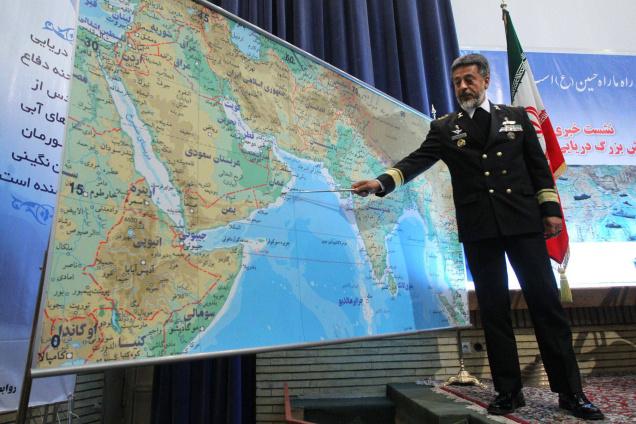
Iran is accused of plotting a oil tanker accident on Hormuz strait to punish West for sanctions with an environmental disaster via large scale oil spill that would end sea life in the region.
Tehran / NationalTurk – And the Iranian plot already has a name : Operation ‘ Murky Waters ‘ according to German weekly Der Spiegel Magazine. A top-secret Iranian plot to cause a deliberate and massive oil-tanker spill at the entrance to the Persian Gulf ob Hormuz Strait has allegedly been leaked to Western intelligence agencies. The environmental disaster plan, codenamed ‘ Murky Waters ‘ and first reported in the German news magazine Der Spiegel, was reportedly intended to “punish” the West for imposing sanctions against Tehran over its nuclear programme.
Iran is considering the possibility of spilling oil in the Persian Gulf in Hormuz Strait in order to contaminate the waters of the strategically important Strait of Hormuz, German weekly Der Spiegel reported on last Sunday. The oil spill would be a way of ‘punishing’ and a retaliation attempt the West and forcing it to decrease the economic sanctions imposed against Tehran government.
Iran Sanctions : Is Iran that mad to plot an oil spill on Hormuz strait ?
Citing Western intelligence sources, the Der Spiegel reported that the plan, codenamed “Murky Waters,” is meant to block shipping routes in the Gulf to international oil tankers with a large scale environmental disaster. The idea, said to have been drawn up by the leader of Iran’s hardline Revolutionary Guards, General Mohammad Ali Jafari, was to wreck or sabotage an oil tanker in the Straits of Hormuz – the narrow seaway between Iran and Oman which is used by more than a third of the world’s oil tankers to enter the Persian Gulf.
In addition driving up oil prices, the resulting environmental disaster would force Western countries to start a large-scale cleanup operation in cooperation with Iran, which could reduce the sanctions currently placed on the country.
The intelligence report suggests the Iranian plan was developed by the commander of Iran’s Revolutionary Guard, Gen. Mohammad Ali Jafari, and Navy Commander Rear Admiral Ali Fadavi.
An oil spill from such a large tanker would cause a big scale environmental disaster in Hormuz strait, one of the busiest international waterways, and force at least the temporary and hugely costly closure of the Persian Gulf to shipping, according to details published by Der Spiegel.
Would Iran shit where it eats ? Western sanctions to catalyse an artificial environmental disaster ?
NationalTurk strategical analyst HT evaluated the dire report and concluded that Iran ‘ would not dare to shit where it eats ! ‘
Western intelligence sources stated the environmental disaster proposal was meant to “punish” hostile western governments for placing sanctions on the regime of President Mahmoud Ahmadinejad in the belief that Tehran is trying to build nuclear weapons. Israel, who has the world’s second biggest nuclear weapons arsenal, has threatened to attack Iranian nuclear installations before any such device is created, while the West’s sanctions have largely been seen as attempt to mollify the Israelis. Iran insists that its nuclear ambitions are peaceful.
Der Spiegel’s report points out that an environmental clean-up would be possible only with technical support from Iran. As a result, Western nations “could be forced to relax sanctions against Iran or drop them altogether”. General Jafari helped to lead the revolution which overthrew the Shah of Iran and brought Ayatollah Khomeini to power in 1979. He was among student protesters who stormed the US embassy in Tehran that year. Jafari has commanded the fiercely anti-Western Revolutionary Guards, or Pasadaran, since 2007.
The 55-year-old war commander is known for advocating extreme responses to threats against Iran. In 2009, he declared that Tehran would launch a rocket attack against Israel’s Dimona nuclear facility if Israel attacked Iranian atomic plants which the Islamic republic claims for usimg for non-militart purposes. Although not all of the Iranian general’s colleagues share his radical views, 13 of the Iranian regime’s 21 ministers have undergone Pasadaran training.
General Jafari is reported to have drawn up the sabotage plan together with Admiral Ali Fadawi, another leader of the Revolutionary Guards. Der Spiegel quoted Western intelligence sources as saying that the plot was a clear sign that the Iranian government was frustrated and that Western sanctions were hurting the Islamic regime more than it was prepared to admit.
In a recent interview, Iran’s Foreign Minister, Akbar Salehi, snubbed the effects of the sanctions, which have targeted the oil and banking sectors in Iran , had merely caused ‘some inconveniences’.
However, half of the Iranian economy is dependent on oil exports and since the imposition of sanctions in July 2011, its overseas sales of crude have dwindled from 2.4 million barrels a year to just under one million. In recent weeks, soaring inflation has led to street protests in major Iranian cities.
China is the n0. 1 importer of Iranian oil.
[adrotate banner=”57″]
